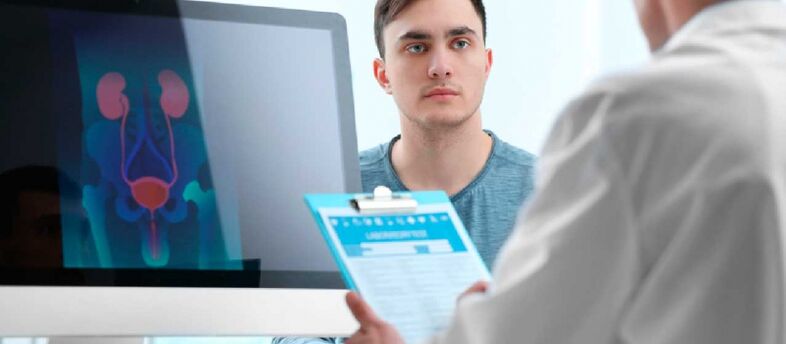Prostatitis is commonly referred to as the inflammatory process that develops in the prostate gland in men. This disease has unpleasant symptoms and has many complications, one of which is infertility. So what is prostatitis and how dangerous is the disease to the health of the male reproductive system? With these questions, you should contact a urologist. Your doctor will tell you exactly why prostatitis occurs, what type of prostatitis is, and how to properly treat it.
The lack of timely medical care is the cause of the infection turning into a chronic form. With symptoms of prostate disease, treatment should be started immediately. Otherwise, the infection can have dangerous consequences, including tissue hyperplasia. Since it is extremely difficult to cure acute prostatitis on your own, contact a urologist immediately. With an unfavorable course, the disease causes inflammation of the testicles, appendages, and kidney structures.
Reason for development
In modern men, prostate lesions are not uncommon. Today it is diagnosed both as an independent disease and as one of the symptoms of urinary disorders - urethritis, prostate tumor, cancer, kidney pathology.
The cause of prostatitis is often related to the activity of infectious agents and pathogenic factors. Inflammation caused by staphylococcus, E. coli, enterococci and other common pathogens. Determining the causative agent in prostatitis is extremely important from which to choose an effective drug treatment.
Risk group

At risk are people with weakened immune systems, sexually transmitted diseases, genital damage, and a habit of holding urine. Not all men know why prostatitis is dangerous, what it is and what factors can trigger the development of the disease. A frivolous attitude to a person's health often leads to a prolonged course of the inflammatory process. The educational work of urologists helps to form a correct conception of such a disease as prostatitis and its possible consequences.
Prerequisites
Urologists pay special attention to the possible causes of prostatitis: treatment is much more effective if it targets the main causative factors. This will significantly reduce the risk of exacerbations of the inflammatory process.
Possible causes of prostate disease:
- exacerbation of kidney disease;
- trauma of the genital organs;
- Hypothermia;
- increased exposure to radiation to the body;
- spread of infection from other pelvic organs;
- violation of the usual rhythm of sexual activity;
- prolonged stay in a sitting position;
- compress the genitals with tight underwear, trousers and jeans;
- the development of urinary diseases, infection with venereal infections;
- chronic stress;
- General suppression of the immune system.
If you have prostatitis, the underlying cause should be determined by a qualified medical practitioner. First of all, you need to contact a urologist. He will conduct an examination and prescribe a comprehensive examination.
Stagnant blood is the main cause of prostatitis
Effective home treatment of prostatitis is impossible without eliminating the causative agents of stagnation in the pelvis. Violation of the outflow of blood causes fat peroxidation, the release of exudate, the appearance of swelling inside the tissues of the gland. This creates favorable conditions for the active reproduction of pathogenic microorganisms. After learning about the possible causes of inflammation, you can understand how to treat prostatitis at home without the disease turning into a dangerous chronic form.
Diagnostic method
To understand how to treat prostatitis in a particular man, it is necessary to conduct a diagnosis. Only then can you choose certain drugs and techniques. Based on the results of laboratory and instrumental studies, a urologist can determine how to treat prostatitis for men and how to prevent future recurrences.
The main diagnostic methods for prostatitis:
- determine the level of PSA in the blood;
- Prostate ultrasound;
- diagnostic tests of blood, urine;
- ureteroscopy;
- cystoscopy;
- rectal examination of the gland;
- urodynamic studies (cystometry, profilometry, flow measurement).
Comprehensive diagnosis helps to quickly select an effective home treatment for prostatitis, prescribe medication to destroy the specific infectious agent.
Check PSA
PSA testing not only helps to detect cancerous processes in the gland, but also to monitor the effectiveness of treatment for diagnosed tumors and prostatitis. This method helps to increase the effectiveness of treatment and reduce the risk of complications.
So PSA screening, although a rather controversial type of prostate cancer early diagnosis, in most cases it allows you to start treatment at the right time, which is certainly veryimportant for a person with chronic inflammatory and hyperplastic processes.
Combined with other diagnostic methods that screen for false positives in prostate screening, the PSA test is a decent way to prevent cancer and monitor ongoing treatment. If several positive results are repeated, prostate tissue will be obtained for further biological examination.
Symptoms of the disease
Prostatitis in men can have many different symptoms, depending on the stage of the disease. The acute form of the disease usually appears on the background of infection of the pelvic organs and progresses relatively easily, without symptoms of intoxication and fever. If signs of prostatitis in men appear, you should immediately contact a urologist for timely treatment, to avoid developing complications.
Acute prostatitis is characterized by the following symptoms:
- frequent, painful urination;
- pain in the sacrum, genitals and perineum;
- syndrome of increased pain during defecation, sexual frigidity;
- body temperature rises;
- feeling that the bladder is partially full and empty (due to pressure on the ureter by an inflamed prostate gland);
- intoxication increases, muscle and joint pains appear;
- possible urinary retention.

If you have one or more signs of prostatitis, you should contact a specialist. Even if the state of health is satisfactory, the pathological process can proceed to clear the signs, but at the same time cause complications.
The course of chronic prostatitis
The chronic inflammatory process can progress almost without symptoms. Men may experience mild pain while urinating, mild coma, chronic fatigue syndrome, and sexual dysfunction.
Men note the following pathological signs (depending on the form and stage of the inflammatory process):
- pain when urinating;
- partial or complete retention of urine;
- pain in the sacrum, perineum;
- increased body temperature;
- severe weakness, reduced performance;
- painful defecation;
- decreased libido, impotence.
The deleted picture of the chronic form of the disease causes the patient to misunderstand and delay the visit to the urologist, and the delay will lead to the development of complications: swelling of the prostate gland, acute urinary retention, prostate abscess, orchitis and seminal vesicles. , which often leads to incurable male infertility.
The clinical manifestations of prostatitis vary according to the stage of the disease. If this process develops for the first time, then the patient feels severe discomfort, pain in the pubic bone and perineum, complains of painful sensations, frequent urination. Body temperature may rise and pus may drain from the urethra. In the absence of medical care, the pathological process can be as complicated as sepsis, purulent prostatic abscess, seminal vesitis, inflammation of the testicles and their appendages (epididymitis).
Prostatitis treatment
Prostatitis is being treated at home. Hospitalization is indicated for purulent complications and severe toxic syndrome. The specialist prescribes antibiotics (taking into account the sensitivity), conducts anti-inflammatory therapy. After the acute process is in remission, physiotherapy, prostate massage are indicated.
Since it is possible to treat prostatitis at home only after consulting a doctor, it is impossible to use folk remedies and methods without the permission of a urologist. Unconventional methods are especially dangerous in severe cases. Treatment of prostatitis at home can lead to the transformation of the disease into a recurrent chronic form.
Medical therapy
How to effectively treat prostatitis with drugs? Drugs can be effective if they are selected taking into account the nature of the disease. Infectious agents can be identified by laboratory tests. As for how to treat your prostate, you're better off asking a urologist.
Among the drugs, the following groups of drugs are used:
- antibiotics;
- analgesic;
- diuretic;
- Anti-inflammatory.
The drug is prescribed in courses for 2-4 weeks. A good antibiotic with a broad spectrum of action will help destroy the infection in the tissues of the gland, stopping the spread of the infection. Treatment of chronic prostatitis at home lasts up to 4-6 months. The inflammatory process that arises is much more difficult to cure and takes longer.
Physical therapy
Physiotherapy is used mainly after the elimination of acute symptoms of the disease, when a man's health returns to normal, adequate urine output is restored. The goal of physical therapy is to restore normal blood circulation. It is the decrease in blood flow that contributes to the active reproduction of pathogenic microorganisms.
Physiotherapy is recommended especially in the chronic phase of the disease. Specialist doctors prescribe laser treatment with anti-inflammatory effects, stimulate local immunity, eliminate pain and discomfort, and kill bacteria. In addition, with prostatitis, ultrasound and electromagnetic techniques are used. It is possible to prescribe medication for diabetes with medicinal herbs that have a therapeutic effect.
Prostate massage
How can prostatitis be treated with massage? This method is effective, but it is used a few weeks after starting treatment, when the acute pain disappears, normal urination returns. Massage should not be performed by inexperienced people. This can cause serious harm to health.
The technique is based on gentle action on the prostate gland. Massage helps push the accumulated inflammatory secretions into the ducts of the organ, from where it enters the urethra and is completely painlessly and safely removed from the body. The method restores blood circulation in the pelvic organs, eliminates the prerequisites for continued reproduction of infectious microorganisms. Prostate massage well copes with the stagnation process and increases the effectiveness of antibiotics and other drugs.
General recommendations
Lifestyle changes should be made to avoid sexually transmitted diseases, hypothermia, and stress. A man should give up tight underwear that squeezes the genitals and disturbs blood circulation in the pelvis. Have a regular sex life, but take precautions against STIs through unprotected intimate contact.
Serious violations of the diet can cause a recurrence of prostatitis. Do not abuse spices, seasonings, smoked meats and alcohol. You should also give up strong coffee, overly salty dishes, and sauces.
The effectiveness of folk methods
Many people are interested and want to know how to cure prostatitis at home without drugs. But drugs, especially antibiotics, are essential for prostatitis. Only with their help is it possible to cure prostatitis at home without infectious complications.
There is an opinion that if the disease causes hypothermia, then there is no need to use antibacterial drugs. Since most men have to treat prostatitis at home, they often reject antibiotics in favor of traditional medicine. But hypothermia or other seemingly innocuous predisposing factors set the stage for the reproduction of Escherichia coli, staphylococcus, and other microorganisms.
Therefore, you should not try to learn about home remedies for prostatitis in unproven ways. This can put a man's life and reproductive health at risk.

























